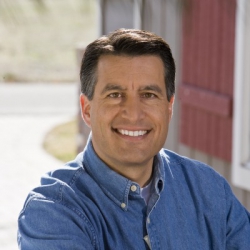Nevada Governor Brian Sandoval told Steve Tetreault of the Las Vegas Review Journal this week that the merging of online poker player pools between Nevada and Delaware is “imminent”. 888 Poker will be the first operator on the network, through the WSOP.com website.
The two states, which have experienced disappointing results from their forays into online gambling, hope their interstate gaming compact will provide a new source of revenue. The Unlawful Internet Gambling Enforcement Act of 2006 made it unlawful for financial institutions to process transactions from unlawful online gambling sites.
The UIGEA gave states the right to legalize gambling within its borders. Also, two states can agree to combine their players pools, like they do in the multi-state Mega Millions and Powerball lotteries.
Delaware and Nevada signed an interstate poker compact in the Spring of 2014, but implementation has been slow.
Why a Compact Is Needed
Nevada has the 35th-largest population among the United States, while Delaware is 45th on the same list. Their small populations have limited growth of their gaming industries, especially in the online poker room category.
Online poker rooms need a lot of customers to fill out their player-vs-player format. Each table needs 9 real poker players. The best online card rooms have games goes 24/7 for No-Limit Texas Hold’em, Pot-Limited Texas Hold’em, Omaha Holden, Seven-Card Stud, and other variants of poker. One game of each isn’t enough, because rooms attract low-stakes, medium-stakes, and high-stakes players.
Also, poker sites offer large-scale freezeout tournaments, events with rebuys and add-ons, turbo events and sit-‘n’go events, and cash games. Each gaming option needs 9 more players, so a good poker room needs hundreds of gamblers online at any times. The best poker sites with the biggest jackpots have thousands of players involved at once.
Poker Room Death Spiral
If a player visits a poker room and the selection isn’t good, that player is likely to leave the site. Even worse, that gambler is likely to tell friends and online acquaintances, further damaging business. Thus, the online poker sites for Nevada and Delaware have been plagued with inactivity. Pooling player communities gives each a chance to reset their product. It also holds out promise that other states join the interstate poker compact, increasing their player pools even more.
Federal Law Still in Question
The question of legality under the UIGEA is still somewhat in doubt. As the UIGEA reads, the activities outlawed are those considered illegal under the Wire Act, but there is disagreement about which activities those are. The Wire Act was passed in a time when sports betting was transacted over phone lines, but casino gambling and poker could not be handled in the same fashion. Therefore, wire-transacted poker, gaming machine, and casino table game betting were not explicitly banned.
From 2007 to 2011, the US Justice Department viewed online sports betting, casinos, and poker sites to be under the auspices of the 1961 Wire Act. In 2011, the Justice Department changed that stance, because the Wire act specifically mentioned sports betting, but nothing else. That is the current policy of the US government, but Sen. Linsdey Graham of South Carolina and Rep. Jason Chaffetz of Utah have introduced legislation (called “Restoration of the Wire Act”) to both houses of the US Congress that would ban online casinos and card rooms categorically across 50 states.
GOP versus GOP Interest Group
It’s a complicated issue. Chaffetz and Graham are backed by Sheldon Adelson, the gaming executive and GOP donor who bankrolled Republican causes to the tune of $90 million in the 2012 presidential election cycle.
But several prominent Republicans have lined up against Restoration of the Wire Act, citing concerns about increasing the power of the federal government and its infringement of states rights (and privacy rights).
Anti-tax crusader Grover Norquist, one of the most powerful figures in the Republican Party, is against RAWA. So is former US Representative Ron Paul, the American Conservative Union (founded by the late-William F. Buckley), Americans for Tax Reform, and the Republican Governors Association. Bipartisan and non-affiliated groups like the National Conference of State Legislatures, the National Governors Association, and the Fraternal Order of Police have voiced their own opposition to the legislation, citing many of the same concerns.

